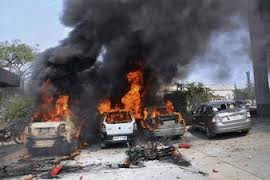
New Delhi, Feb 21: The two-day Bharat bandh called by 11 major trade unions is into its second day today. Banks are shut like yesterday and public transport in many cities remains affected.
Noida adjoining Delhi, where factories and vehicles came under mob attacks yesterday, is under heavy police watch. At least 71 people have been arrested for vandalising factories at a hosiery complex and setting 25 vehicles, including a fire engine, on fire.
Sixty four cases have been registered against the protesters, but it's not clear if they were trade union workers or people leveraging the bandh to loot offices. The factory-owners say they suffered a loss of Rs. 600 crore and allege that the police reached the sites of violence late.
The response to the bandh today appears to be mixed. In Delhi, there are fewer autorickshaws on the roads although government buses are running.
In Bangalore, schools and colleges are closed. A few autorickshaws and buses are running. Shops are open and information technology companies are working.
But public transport in Thiruvananthapuram remains crippled like yesterday. The government's threat to cut pay has not deterred employees from joining the strike.
The situation is better in Kolkata, where taxis are plying and government offices, factories and most shops are open. The Mamata Banerjee government is determined to defeat the strike and has warned government employees that they will lose pay if they miss work.
Government buses are not running in Lucknow and public sector banks are closed. Yesterday, some 50,000 state road transport employees were on strike across Uttar Pradesh and around 9,000 buses were off the roads.
The Bharat bandh has been called to protest against rising prices and disinvestment in public sector enterprises and to demand more jobs. Industry body Assocham estimates the loss from the two-day strike to be Rs. 26,000 crore.
The major unions participating in the strike are Bhartiya Mazdoor Sabha, Indian National Trade Union Congress (INTUC), All India Trade Union Congress (AITUC), Centre of Indian Trade Unions (CITU) and All India United Trade Union Centre (AIUTUC).





Comments
Add new comment